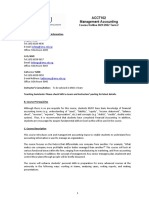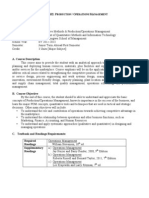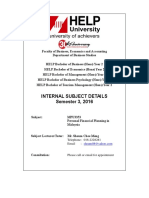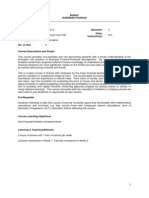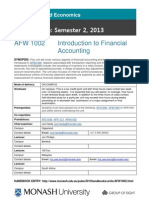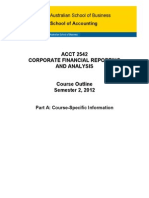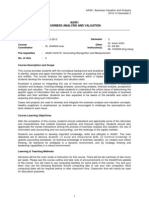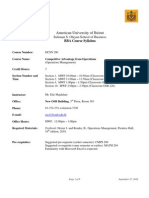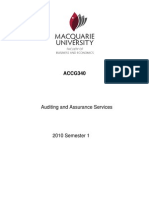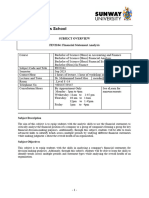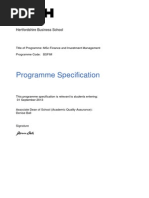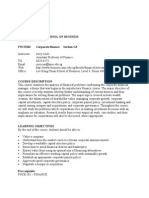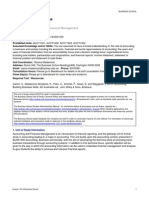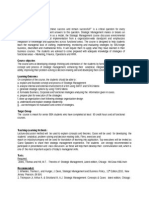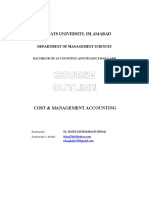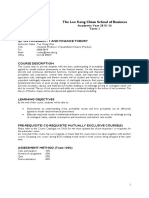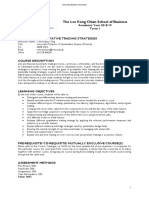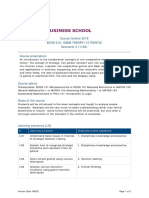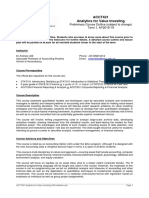Acct408 - Cheng Nam Sang
Acct408 - Cheng Nam Sang
Uploaded by
Hohoho134Copyright:
Available Formats
Acct408 - Cheng Nam Sang
Acct408 - Cheng Nam Sang
Uploaded by
Hohoho134Original Description:
Original Title
Copyright
Available Formats
Share this document
Did you find this document useful?
Is this content inappropriate?
Copyright:
Available Formats
Acct408 - Cheng Nam Sang
Acct408 - Cheng Nam Sang
Uploaded by
Hohoho134Copyright:
Available Formats
SMU Classification: Restricted
ACCT 408 Valuation
Course Outline 2018/2019 Term 1
A. Instructor and Contact Information
CHENG Nam Sang, Associate Professor of Accounting (Practice)
Room 5042 (Level 5) Tel: (65) 6828-1910
School of Accountancy Fax: (65) 6828-0600
Singapore Management University Email: nscheng@smu.edu.sg
Consultation time: By appointment (preferred due to instructor’s compact timetable) or
drop-by to the office (trying your luck)
Teaching Assistant: More details will be provided at a later stage.
B. Course Prerequisites
Students enrolling in this course must have successfully completed FNCE101 Finance (passing
grade)/FNCE103 Finance for Law (min. A- grade) and ACCT201 Corporate Reporting and
Financial Analysis/ACCT224 Financial Reporting and Analysis.
Note that knowledge of intermediate financial accounting (ACCT334) might be preferable for
this course. Stronger accounting skills will of course make some of the material easier to
understand.
C. Course Description
This course covers valuation and analysis of financial statements, and will include the valuation
of businesses and entities, and various components. The focus will be primarily on valuation
from the perspective of corporate managers and for business entities rather than from the view
of assigning value to individual assets and/or portfolio analysis. An examination of certain
critical steps in the valuation process will all be covered. This includes examination of: key
accounting policies, accounting adjustments, financial statement analysis, forecasting and
discount rate estimation. Special topics for application will include: (a) analysis of different
valuation models, (b) valuation for securities analysis and (c) use of financial information in
credit and default prediction.
The objective of this course is to equip students with tools and techniques to be able to (a)
identify accounting issues in, (b) understand and evaluate financial statements as well as (c)
value companies. First, students need to be able to understand the information provided in
financial reports and the various complexity of accounting treatments under International
Financial Reporting Standards (IFRS). Second, the course will emphasize the role of
accounting in both the financial analysis and valuation processes. Third, the application of
valuation of business entities is important in many areas. All of these tools and techniques will
be useful for students intending on pursuing a professional careers in any of the areas of:
ACCT408 Valuation (Prof Cheng Nam Sang) Course Outline
SMU Classification: Restricted
financial analysis, investments, asset management, credit and loan assessment, management
consulting, corporate advisory services as well as mergers and acquisitions.
D. Learning Goals, Course Objectives and Skills Development
This course contributes to the development of the following learning goals and objectives of
the School’s Bachelor of Accountancy program:
Learning Goal 1 (Accounting Competencies):
Learning Objective 1.1 – Our students can recognize, develop, measure,
record, validate and communicate financial and other related information.
Learning Objective 1.2 – Our students can analyze, synthesize and evaluate
financial and other related information for decision making in a management
context.
At the end of this course, students are expected to be able to:
1. Understand how information is presented in the financial statements and the necessary
assumptions and issues of how this financial information is compiled.
2. Be able to use various financial analysis techniques for analyzing the efficiency and
effectiveness of business organizations.
3. Understand the usefulness and limitations of, as well as apply alternative valuation
models and techniques to value business entities.
4. Perform a valuation of a business including the following: identifying drivers of the
business’s performance, making appropriate analytical adjustments, forecasting the
business’s financial statements, estimating the appropriate cost of capital, and sanity
checks on valuation outcomes.
5. Conduct and evaluate security analysis and use financial information for credit analysis
as practical applications of valuation.
Beyond just technical competencies, this course also seeks to develop students:
Analytical and communication skills;
Ability to work in teams;
Ability to engage in active learning within a dynamic and uncertain environment; and
Awareness of ethical and social responsibility considerations in business decision
making.
E. Learning Approach
The pedagogical approach to this course consists of:
Instructor-facilitated Learning – principally through in-class lessons and in-class
problem activities.
Individual Learning – through pre-class preparation, readings, and review of in-class
problems as well as textbook discussion and problem questions.
Collaborative Learning – through participation in class discussions and teamwork in
the in-class problems and group assignments.
ACCT408 Valuation (Prof Cheng Nam Sang) Course Outline
SMU Classification: Restricted
F. Textbook and Other Resources
Required Text:
Business Valuation
Eric Teo Khee Hwee, Low Buen Sin and Jason Doan Thuan Hai,
1st edition, 2018
Cengage Learning
G. Assessment
To pass the course, a student is required to obtain a total mark of 50% or better. The assessment
components are listed below: Progress Assessments (20%), Class Participation and Activities
(10%), Group Project (20%) and Final Examination (50%).
1. Progress Assessments (20%)
There will be one mid-term test during the term. The test will be conducted in-class in Week 9
(subject to change).
2. Class Participation and Activities (10%)
Class learning activities are designed to give you opportunities to participate in and contribute
to your own learning and that of the entire class. This is typically done through in-class
participation, project presentation, homework assignment, and may include other assigned
work, tasks, or questions (e.g. pre-class preparations and post-class reviews) during the term
that will help you prepare for the class and review course materials in a timely manner.
Voluntary class participation is expected, however, I will cold call on individuals in class from
time to time.
3. Group Project (20%)
The group project aims to provide students with an understanding of business valuation
practices. Students should be able to critically analyze and evaluate various aspects, with
emphasis on (but not limited to), of the topics discussed in the course, and value the business
using appropriate valuation models discussed in the course. More details on the project will be
disclosed during the term.
4. Final Examination (50%)
Further information will be provided as the term progresses. The final examination is a closed-
book, of three (3) hours duration and covers the entire course.
Important Notice on Date and Time of Final Exam
At SMU, the dates and times of all final exams are announced well in advance of each term’s
course bidding. Students should note the official date and time of the final exam for this
course as published by the Office of Registrar. Requests by students to take the final exam on
other than the officially scheduled date and time will not be approved except under extremely
extenuating circumstances entirely beyond the student’s control. Students who believe they
may be unable to take the final exam on the scheduled date and time should not enroll for this
course this term.
ACCT408 Valuation (Prof Cheng Nam Sang) Course Outline
SMU Classification: Restricted
H. Academic Integrity
All acts of academic dishonesty (including, but not limited to, plagiarism, cheating,
fabrication, facilitation of acts of academic dishonesty by others, unauthorized possession of
exam questions, or tampering with the academic work of other students) are serious offences.
All work (whether oral or written) submitted for purposes of assessment must be the student’s
own work. Penalties for violation of the policy range from zero marks for the component
assessment to expulsion, depending on the nature of the offense. When in doubt, students
should consult the instructors of the course. Details on the SMU Code of Academic Integrity
may be accessed at http://www.smuscd.org/resources.html.
I. Accessibility
SMU strives to make learning experiences accessible for all. If you anticipate or experience
physical or academic barriers due to disability, please let me know immediately. You are also
welcome to contact the university's disability services team if you have questions or concerns
about academic provisions: included@smu.edu.sg.
Please be aware that the accessible tables in our seminar room should remain available for
students who require them.
J. Emergency Preparedness for Teaching and Learning (EPTL)
As part of emergency preparedness, Instructors may conduct lessons online via the WebEx
platform during the term, to prepare students for online learning. During an actual
emergency, students will be notified to access the WebEx platform for their online lessons.
The class schedule will mirror the current face-to-face class timetable unless otherwise stated.
K. Lesson Plan
The course will be conducted in class sessions that will last for 3 hours each with a short
break in between. You are expected to come to these sessions prepared and be ready to
respond to questions as required. This means doing the required readings and/or homework
for each session.
A brief outline of course schedule is provided below:
Week 1: Business Value & Its Drivers
Week 2: Investment Appraisal techniques
Week 3: Business Valuation techniques (I) - Market-based and asset-based
Week 4: Business Valuation techniques (II) - Income-based approach
Week 5: Business Valuation techniques (III) – Business Valuation through capital
budgeting techniques
Week 6: Business Valuation techniques (IV) Business Valuation through Capital
Structure
Week 7: Business Valuation techniques (V) – FME, EVA, MVA
Week 8: Term Break
Week 9.1: Mid-term Test (2 hours)
Week 9.2: Impact of financing on Investment Decisions
ACCT408 Valuation (Prof Cheng Nam Sang) Course Outline
SMU Classification: Restricted
Week 10: International Investments and Financing Decisions
Week 11: Valuation and risk management in Mergers and Acquisitions
Week 12: Valuation Issues in Mergers and Acquisitions – Intangible Assets and Goodwill
Week 13: Valuation of high-growth start-ups
Week 14: Pre-exam Study Week
Week 15: Examination
The detailed course work plan will be announced in class. Note that this schedule is subject to
change. Alternative times or activities will be arranged should they become necessary.
Vetted by: Seow Poh Sun 19 June 2018
ACCT408 Valuation (Prof Cheng Nam Sang) Course Outline
You might also like
- Financial Reporting Accounting MBA SyllabusDocument4 pagesFinancial Reporting Accounting MBA SyllabusMohammed NaderNo ratings yet
- School of Business Administration FIN330101: Principles of Finance Fall 2021 Course SyllabusDocument7 pagesSchool of Business Administration FIN330101: Principles of Finance Fall 2021 Course SyllabusHamza AmmadNo ratings yet
- ACCT102 MA Course Outline 2021-2022 S2 FinalDocument9 pagesACCT102 MA Course Outline 2021-2022 S2 FinalCherlin LeongNo ratings yet
- ACCT224Document9 pagesACCT224thinkstarzNo ratings yet
- ACCT201 Corporate Reporting & Financial Analysis: Course Outline 2018/2019 Term 1Document4 pagesACCT201 Corporate Reporting & Financial Analysis: Course Outline 2018/2019 Term 1Hohoho134No ratings yet
- UoS Outline ACCT6007 SEM1 2013 ApprovedDocument9 pagesUoS Outline ACCT6007 SEM1 2013 ApprovedSweetCherrieNo ratings yet
- Unit of Study Outline FINC2012bDocument8 pagesUnit of Study Outline FINC2012bMichaelTimothy0% (1)
- FINN 400-Applied Corporate Finance-Atif Saeed Chaudhry-Fazal Jawad SeyyedDocument7 pagesFINN 400-Applied Corporate Finance-Atif Saeed Chaudhry-Fazal Jawad SeyyedYou VeeNo ratings yet
- Acct101 - Charmayne HighfieldDocument5 pagesAcct101 - Charmayne Highfieldrachel.mack.2022No ratings yet
- ACCT335 PT Public VersionDocument6 pagesACCT335 PT Public VersionNurhanifah SoedarsNo ratings yet
- UoS Outline ACCT6007 SEM2 2013 ApprovedDocument9 pagesUoS Outline ACCT6007 SEM2 2013 ApprovedSweetCherrieNo ratings yet
- Faculty of Economics and Business Universitas Gadjah Mada Undergraduate Program Syllabus Aku 1601 - Introductory AccountingDocument4 pagesFaculty of Economics and Business Universitas Gadjah Mada Undergraduate Program Syllabus Aku 1601 - Introductory Accountingaurelia kaneishaNo ratings yet
- The University of Hong Kong Faculty of Business and Economics School of BusinessDocument10 pagesThe University of Hong Kong Faculty of Business and Economics School of BusinessSean ShiangNo ratings yet
- Accounting - Foundation Course 2023-24Document5 pagesAccounting - Foundation Course 2023-24Zoom MailNo ratings yet
- Syllabus SMDocument5 pagesSyllabus SMUlumuddin ChasanNo ratings yet
- ACCT 100-Principles of Financial Accounting - Asad Alam-Ayesha Bhatti-Syed Zain Ul AbidinDocument7 pagesACCT 100-Principles of Financial Accounting - Asad Alam-Ayesha Bhatti-Syed Zain Ul AbidinmuhammadmusakhanNo ratings yet
- POM 102 SyllabusDocument8 pagesPOM 102 SyllabusmarkangeloarceoNo ratings yet
- Mpu 3353Document22 pagesMpu 3353herueuxNo ratings yet
- ACCT2542 Corporate Financial Reporting and Analysis S22014Document26 pagesACCT2542 Corporate Financial Reporting and Analysis S22014Piyal HossainNo ratings yet
- Silabus SPM PDFDocument4 pagesSilabus SPM PDFAco AritonangNo ratings yet
- Syllabus FINA210 Business Finance FALL 2013Document6 pagesSyllabus FINA210 Business Finance FALL 2013Mahmoud KambrisNo ratings yet
- ACCT1501 Accounting and Financial Management 1A S12015Document26 pagesACCT1501 Accounting and Financial Management 1A S12015Lauren Wilson0% (1)
- Course Syllabus For ACC1002XDocument3 pagesCourse Syllabus For ACC1002XethanchiaaNo ratings yet
- 189 SyllabusDocument8 pages189 SyllabusAlicea LinNo ratings yet
- ACCT2522 Management Accounting 1 Course Outline S1 2016Document17 pagesACCT2522 Management Accounting 1 Course Outline S1 2016Anna ChenNo ratings yet
- Syllabus - Financial Accounting BA005IUDocument8 pagesSyllabus - Financial Accounting BA005IUNgoc Khanh Linh NguyenNo ratings yet
- UoS Outline ACCT6014 SEM1 2013 ApprovedDocument9 pagesUoS Outline ACCT6014 SEM1 2013 ApprovedSweetCherrieNo ratings yet
- Course Outline BU8201 Jan 2014Document4 pagesCourse Outline BU8201 Jan 2014Nhân TrầnNo ratings yet
- ACCT1511 Accounting and Financial Management 1B S12015Document16 pagesACCT1511 Accounting and Financial Management 1B S12015Bob CaterwallNo ratings yet
- Acct 402Document6 pagesAcct 402zhentang89No ratings yet
- S2 Course OutlineDocument19 pagesS2 Course OutlineNovels4lyfNo ratings yet
- AFW 1002 Introduction To Financial Accounting: Unit Guide: Semester 2, 2013Document12 pagesAFW 1002 Introduction To Financial Accounting: Unit Guide: Semester 2, 2013Kirabo TakirambuddeNo ratings yet
- Acct221 - Wong Suay PengDocument3 pagesAcct221 - Wong Suay PengHohoho134No ratings yet
- BUECO6923 Course Description CUCST Semester 1 2012Document11 pagesBUECO6923 Course Description CUCST Semester 1 2012Alex KouiderNo ratings yet
- Course SpecificationDocument8 pagesCourse SpecificationmohsinameerNo ratings yet
- ACCT2542 Corporate Financial Reporting and Analysis S22012 PartADocument16 pagesACCT2542 Corporate Financial Reporting and Analysis S22012 PartAAngela AuNo ratings yet
- Acc707 Auditing and Assurance Services t116 GH 15 Feb 2015-FinalDocument11 pagesAcc707 Auditing and Assurance Services t116 GH 15 Feb 2015-FinalHaris AliNo ratings yet
- Syllabus MOS 1023A Fall 2022Document8 pagesSyllabus MOS 1023A Fall 2022Croissant DietNo ratings yet
- Subject Overview ACC3044 (March 2014)Document6 pagesSubject Overview ACC3044 (March 2014)Gurrajvin SinghNo ratings yet
- Financial Accounting BA005IUDocument9 pagesFinancial Accounting BA005IUVy Duong TrieuNo ratings yet
- AA301 Business Analysis and ValuationDocument18 pagesAA301 Business Analysis and ValuationPriscillia SerNo ratings yet
- DCSN200 Operations Management Spring 2012Document8 pagesDCSN200 Operations Management Spring 2012Maya Hariri HallabNo ratings yet
- FINS3616 - Course OutlineDocument15 pagesFINS3616 - Course OutlineJulie ZhuNo ratings yet
- ACCG340Document11 pagesACCG340Dung Tran0% (1)
- Econ1101 Course OutlineDocument18 pagesEcon1101 Course OutlineJoannaNo ratings yet
- SEP 2023 FIN2104 Subject OverviewDocument5 pagesSEP 2023 FIN2104 Subject OverviewEldon LiewNo ratings yet
- BSFIMDocument12 pagesBSFIMFarRukh IjazNo ratings yet
- Fnce 201Document3 pagesFnce 201Wesly Paul Salazar CortezNo ratings yet
- ACCTFIN 7017 - Financial Statement Analysis (M) - Course OutlinesDocument7 pagesACCTFIN 7017 - Financial Statement Analysis (M) - Course OutlinesRanjeetaTiwariNo ratings yet
- FINC765NY Portfolio MASTER SYLLABUS Fall 2020 PDFDocument10 pagesFINC765NY Portfolio MASTER SYLLABUS Fall 2020 PDFRahil VermaNo ratings yet
- WI15 ADMS 4900R Course OutlineDocument7 pagesWI15 ADMS 4900R Course OutlinezmcoupNo ratings yet
- UoS Outline ACCT1006 SEM2 2014 ApprovedDocument6 pagesUoS Outline ACCT1006 SEM2 2014 ApprovedAbdulla ShaheedNo ratings yet
- UoS Outline FINC2011 SEM2 2014 ApprovedDocument6 pagesUoS Outline FINC2011 SEM2 2014 ApprovedericaNo ratings yet
- ACCT 511 Syllabus Summer 2012 Session A (Version 1.0)Document13 pagesACCT 511 Syllabus Summer 2012 Session A (Version 1.0)Ryan McKinneyNo ratings yet
- FSA-BE SyllabusDocument14 pagesFSA-BE SyllabusThanh Trúc Nguyễn NgọcNo ratings yet
- 1213MGNT4010ADocument6 pages1213MGNT4010AShailesh AtkariNo ratings yet
- MGT 578Document4 pagesMGT 578Ray LeoNo ratings yet
- Course Outline Cost AccountingDocument7 pagesCourse Outline Cost AccountingBilal ShahidNo ratings yet
- How to Practice Before Exams: A Comprehensive Guide to Mastering Study Techniques, Time Management, and Stress Relief for Exam SuccessFrom EverandHow to Practice Before Exams: A Comprehensive Guide to Mastering Study Techniques, Time Management, and Stress Relief for Exam SuccessNo ratings yet
- ECON 212: Game Theory (Fall Term, 2017)Document2 pagesECON 212: Game Theory (Fall Term, 2017)Hohoho134No ratings yet
- QF204 - Tee Chyng Wen - AY15-16 T1Document3 pagesQF204 - Tee Chyng Wen - AY15-16 T1Hohoho134No ratings yet
- QF206 - Ting Hian Ann, ChristopherDocument5 pagesQF206 - Ting Hian Ann, ChristopherHohoho134No ratings yet
- Course Outline 2018 Econ 212: Game Theory (15 Points) Semester 2 (1185) Course PrescriptionDocument5 pagesCourse Outline 2018 Econ 212: Game Theory (15 Points) Semester 2 (1185) Course PrescriptionHohoho134No ratings yet
- The Lee Kong Chian School of Business: Academic Year 2011 /12 Term 2 QF 203 Real AnalysisDocument4 pagesThe Lee Kong Chian School of Business: Academic Year 2011 /12 Term 2 QF 203 Real AnalysisHohoho134No ratings yet
- QF207 - Tee Chyng WenDocument4 pagesQF207 - Tee Chyng WenHohoho134No ratings yet
- Acct221 - Wong Suay PengDocument3 pagesAcct221 - Wong Suay PengHohoho134No ratings yet
- ACCT418 Data Modelling & Visualization: InstructorDocument3 pagesACCT418 Data Modelling & Visualization: InstructorHohoho134No ratings yet
- The Lee Kong Chian School of Business: Academic Year 2018/19 Term 1Document3 pagesThe Lee Kong Chian School of Business: Academic Year 2018/19 Term 1Hohoho134No ratings yet
- Fnce218 - Mandy ThamDocument4 pagesFnce218 - Mandy ThamHohoho134No ratings yet
- ACCT421 Analytics For Value Investing: Preliminary Course Outline (Subject To Change) Term 1, AY2018-19Document3 pagesACCT421 Analytics For Value Investing: Preliminary Course Outline (Subject To Change) Term 1, AY2018-19Hohoho134No ratings yet
- Airlines Eric HenckelsDocument25 pagesAirlines Eric HenckelsSchutzstaffelDHNo ratings yet
- Course Outline: Course Title: Teacher: Days and Times: Textbook: Required Materials/ResourcesDocument2 pagesCourse Outline: Course Title: Teacher: Days and Times: Textbook: Required Materials/ResourcesHohoho134No ratings yet
- Span1b05 Prim12 PDFDocument8 pagesSpan1b05 Prim12 PDFHohoho134No ratings yet
- Sembcorp Code of Conduct English PDFDocument22 pagesSembcorp Code of Conduct English PDFHohoho134No ratings yet
- ANL317Document2 pagesANL317Hohoho134No ratings yet
- Ascendas Singbridge Corporate Brochure enDocument12 pagesAscendas Singbridge Corporate Brochure enHohoho134No ratings yet
- Guidelines For Policy Paper Phase-VDocument2 pagesGuidelines For Policy Paper Phase-VHohoho134No ratings yet
- Course outlineSKMU2113 L1Document7 pagesCourse outlineSKMU2113 L1Hohoho134No ratings yet
- Business FinanceDocument4 pagesBusiness FinanceHohoho134No ratings yet
- StressCrete Spun Concrete Utility Poles BrochureDocument16 pagesStressCrete Spun Concrete Utility Poles BrochureRet GenandoyNo ratings yet
- Shimadzu GC Theory Webinar Series-Session 2Document32 pagesShimadzu GC Theory Webinar Series-Session 2Salman AbuzuhairaNo ratings yet
- Waste Generation WorksheetDocument6 pagesWaste Generation WorksheetmarylandepathNo ratings yet
- Ewm Class 7Document6 pagesEwm Class 7pmanikumar100% (3)
- K Pack Systems Pvt. LTD.: Www. Kpack - inDocument20 pagesK Pack Systems Pvt. LTD.: Www. Kpack - inBắp BắpNo ratings yet
- MSRTC - Online Reservation System 2Document1 pageMSRTC - Online Reservation System 2Pravin LankeNo ratings yet
- Class 2 Computers - Dec 19Document2 pagesClass 2 Computers - Dec 19elizabeth reedNo ratings yet
- Accountancy: Goodwill: Nature and Valuation 1:00 HOURS Maximum Marks: 20Document3 pagesAccountancy: Goodwill: Nature and Valuation 1:00 HOURS Maximum Marks: 20PRABHAT JOSHINo ratings yet
- h15300 Vxrail Network GuideDocument83 pagesh15300 Vxrail Network GuideAlexey1989No ratings yet
- ASPEN25 Abstract Submission Guidelines-Final-9-12-24Document16 pagesASPEN25 Abstract Submission Guidelines-Final-9-12-24CorianderNo ratings yet
- PTA MEETING ProgramDocument2 pagesPTA MEETING ProgramRodel EstebanNo ratings yet
- 4 Controlled Rectifier DC Drives - PpsDocument25 pages4 Controlled Rectifier DC Drives - PpsaswardiNo ratings yet
- Cyberlaw Exam AnswerDocument6 pagesCyberlaw Exam AnswerFaiz Apai100% (1)
- Batangas State University Jplpc-Malvar: College of Industrial TechnologyDocument7 pagesBatangas State University Jplpc-Malvar: College of Industrial TechnologyLesterSanchezCuevaNo ratings yet
- ABA-Constant-Torque Standard-DatasheetDocument1 pageABA-Constant-Torque Standard-DatasheetgauravNo ratings yet
- DPC CaseDocument32 pagesDPC CasechastincoNo ratings yet
- 4th TLE 2Document3 pages4th TLE 2Johnel FranciscoNo ratings yet
- Cases 1 Movable ImmovableDocument9 pagesCases 1 Movable ImmovableMa Tiffany CabigonNo ratings yet
- Maryland Heights PD - Homemade Explosives Recognition GuideDocument58 pagesMaryland Heights PD - Homemade Explosives Recognition Guideßɭǟčk Öpƨ100% (1)
- Hussain 2020Document13 pagesHussain 2020Prince RajputNo ratings yet
- 1 4 Extrema and Average Rates of ChangeDocument35 pages1 4 Extrema and Average Rates of ChangeDenise WUNo ratings yet
- Investigation of Tensile and Flexural Properties oDocument18 pagesInvestigation of Tensile and Flexural Properties oAhmad Haikal Mohd HalimNo ratings yet
- GR00001000 00Document56 pagesGR00001000 00Art Del R SalongaNo ratings yet
- English 7 Q3 Las L1Document5 pagesEnglish 7 Q3 Las L1Akio LukbanNo ratings yet
- Technical Specification: ConfigurationDocument4 pagesTechnical Specification: ConfigurationAhmed RazaNo ratings yet
- Sep2 Copy 2Document16 pagesSep2 Copy 2NishaNo ratings yet
- Human Resource Management (18IM751)Document14 pagesHuman Resource Management (18IM751)Shahid Khan ANo ratings yet
- Open For Business Magazine April / May 15Document15 pagesOpen For Business Magazine April / May 15Eugene Area Chamber of Commerce CommunicationsNo ratings yet
- ICC Moot, The RulesDocument5 pagesICC Moot, The Rulesandreaivydy1993No ratings yet
- 062 Use of Deep Learning Using The YOLOv5 and YOLOv8 Models To Estimate Traffic Sign Recognition EfficiencyDocument6 pages062 Use of Deep Learning Using The YOLOv5 and YOLOv8 Models To Estimate Traffic Sign Recognition Efficiencyerlin.d.pNo ratings yet


